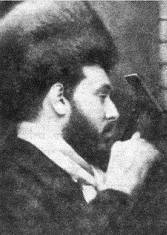The Holy Rabbi who was Murdered in Sanctification of G-d’s Name on Shavuot

When the holy Rabbi Shalom Safrin of Komarno fell ill and was nearing death, he called his son Rabbi Baruch, who was then 24 years old, and entrusted him with the leadership. He told the chassidim: “I desire that my son Rabbi Baruch sit on my throne.”
Rabbi Shalom of Komarno was a holy man, continuing the holy lineage of the Komarno rebbes in Galicia, who were all holy men and giants in the Torah. The Komarno dynasty rebbes were great and and known for their wisdom in Kabbalah and the secrets of the Torah.
Rabbi Shalom, son-in-law of the great Rabbi Yisrael of Stolin, known as “Der Frankfurter” after the city of his burial – Frankfurt, recognized the greatness of his son Rabbi Baruch, his holiness, and the nobility of his leadership, and after his explicit instruction, the multitudes of chassidim accepted Rabbi Baruch as their rabbi and guide, gathered under his shadow on Shabbat and holidays, and frequently visited his residence to discuss G-d’s salvation and mercy.
Rabbi Baruch, born in Stolin, the cradle and breeding ground of Karlin chassidism, was a rare and exquisite blend of these two holy courts that tens of thousands of chassidic Jews had been participating in for generations.
Rabbi Baruch did not plan his future this way. He had always wanted to escape the rabbinate and immigrate to the Land of Israel, and to that end he asked his relative, the “Rebbe of the Land of Israel,” Rabbi Yeshaya Shapira, to help him obtain a certificate. However, upon sitting on the throne of his ancestors, he gave himself to his chassidic Jews and to all of the Jewish People, and began a wonderful and exalted leadership that won over the hearts of many good people.
He opened a yeshiva in Komarno called “Binyan Shalom” after his father, and it excelled in the quality of its students and the good conditions they enjoyed. Rabbi Baruch taught a lesson in the yeshiva every day, loved his students, and nurtured them. His leadership was compassionate and noble, and many flocked to him. He also had many followers in Hungary.
Rabbi Baruch was known as a worshiper of G-d and his prayer lasted for long hours; he would also put on “shimusha raba” tefillin (phylacteries written in a one of the different orders than the more standard one).
During the Holocaust, when the Germans occupied Eastern Galicia, his followers in Hungary obtained an entry permit for him. They believed that this would save his life, but the Rebbe would not leave his mother alone, and she did not have a permit.
As the persecution of the Nazis and their collaborators intensified, the Rebbe revealed his generosity and kindness. He stood up and sold all his valuable belongings, valuable heirlooms that he had with him from his ancestral home, gold and silver vessels, and more, and with the money he supported countless souls who had lost everything and the refugees who crowded Komarno. To those close to him who tried to dissuade him from this, he said:
“If the world remains as it is – I will buy myself new vessels, and if, G-d forbid, the world is destroyed – why do I have these objects?”
As the situation worsened and the Rebbe’s relatives were killed in the Bereznik Forest, the chassidim obtained a Lithuanian passport for the Rebbe, since at that time Vilna still belonged to independent Lithuania, but he refused to go to Vilna. The situation in Kumarno was dire. The Germans executed 470 of the city’s Jews and imposed various decrees on the community. Among other things, the Jews were forbidden to leave the town and were not allowed to earn a living. The Rebbe was a soft and comforting light for the heartbroken Jews of Kumarno, and he did not think of abandoning them. He encouraged everyone to flee to the forests, but about himself he said:
“As long as there is one Jew in the ghetto, I will not leave the ghetto!”
In Kislev 5703 (1943), when the ghetto in Komarno was liquidated, the Rebbe was sent to Sambor, and a few days after their arrival there, his mother, Rebbetzin Chava; his wife, Rebbetzin Shaindel; and their sons, 5-year-old Shalom and 3-year-old Yaakov Moshe, were killed.
“We are soldiers of G-d, and as such we must stand before Him in all situations and thank Him.” According to a version provided by Penina Meizlish, he said this:
“We say in Neila (the closing prayer on Yom Kippur), ‘You set man apart from the beginning and You considered him worthy to stand before You.’ In these terrible days, the body is separated from the head because the mind cannot grasp what is happening, and yet, you set him apart to stand before You – the soldier standing before the king on his watch does not bat an eyelid even if a snake is tied to his heel. We must stand before the King even when our minds are split open from inability to comprehend what is happening to us, the Jews…”
His last words were about Nadav and Avihu who died in the Mishkan (Sanctuary). “In my kin I will sanctify” – God’s kinsmen and those who love Him sanctify Heaven there without question or argument. And indeed, on the seventh day of Sivan, the second day of Shavuot in the Diaspora, the wicked led him to the cemetery, opened the grave of his cousin Rabbi Alter, shot the holy and revered rabbi, and he fell straight into the gaping grave at his feet.
May G-d avenge his blood and may his merit protect us.


A synagogue named after him in Yafo (Jaffa)














